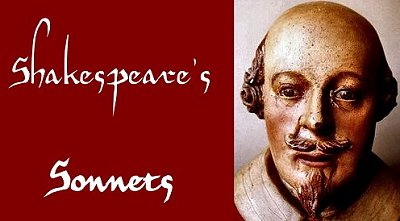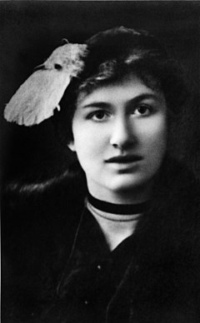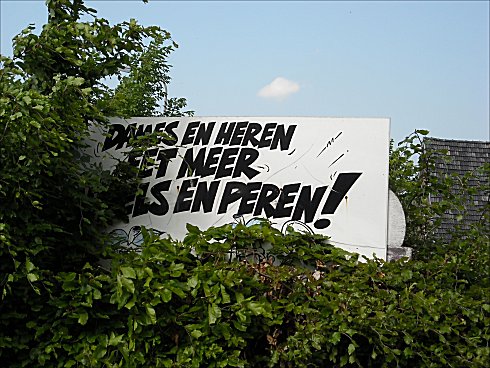Fleurs du Mal Magazine


Or see the index

William Shakespeare
(1564-1616)
THE SONNETS
61
Is it thy will, thy image should keep open
My heavy eyelids to the weary night?
Dost thou desire my slumbers should be broken,
While shadows like to thee do mock my sight?
Is it thy spirit that thou send’st from thee
So far from home into my deeds to pry,
To find out shames and idle hours in me,
The scope and tenure of thy jealousy?
O no, thy love though much, is not so great,
It is my love that keeps mine eye awake,
Mine own true love that doth my rest defeat,
To play the watchman ever for thy sake.
For thee watch I, whilst thou dost wake elsewhere,
From me far off, with others all too near.
![]()
kempis.nl poetry magazine
More in: -Shakespeare Sonnets

Edith Södergran
(1892-1923)
Jungfruns död
Den skära jungfruns själ tog aldrig miste,
hon visste allting om sig själv,
hon visste ännu mer: om andra och om havet.
Hennes ögon voro blåbär, hennes läppar hallon, hennes händer vax.
Hon dansade för hösten på gulnade mattor,
hon kröp ihop och virvlade och sjönk – och slocknade.
Då hon var borta visste ingen att hennes lik låg kvar i skogen…
Man sökte henne länge bland tärnorna på stranden,
de sjöngo om små musslor i röda skal.
Man sökte henne länge bland männen vid glasen,
de stredo om blanka knivar ur hertigens kök.
Man sökte henne länge i fälten av konvaljer,
där hennes sko låg kvar sen sista natt.
(1916)
Edith Södergran poetry
kempis.nl poetry magazine
More in: Archive S-T, Södergran, Edith
.jpg)
Gabriele D’Annunzio
(1863-1938)
Eravamo sette sorelle
Eravamo sette sorelle,
Ci specchiammo alle fontane:
eravamo tutte belle.
Fiore di giunco non fa pane,
mora di macchia non fa vino,
filo d’erba non fa panno lino –
la madre disse alle sorelle .
Ci specchiammo alle fontane:
eravamo tutte belle.
La prima per filare
e voleva i fusi d’oro;
la seconda per tramare
e voleva le spole d’oro;
la terza per cucire
e voleva gli aghi d’oro;
la quarta per imbandire
e voleva le coppe d’oro;
la quinta per dormire
e voleva le coltri d’oro;
la sesta per sognare
e voleva i sogni d’oro;
l’ultima per cantare,
per cantare solamente
e non voleva niente.
Fiore di giunco non fa pane,
mora di macchia non fa vino,
filo d’erba non fa panno lino
la madre disse alle sorelle.
Ci specchiammo alle fontane:
eravamo tutte belle.
E la prima filò
torcendo il suo fuso e il suo cuore,
e la seconda tramò
una tela di dolore,
e la terza cuci
una camicia attossicata,
e la quarta imbandì
una mensa affatturata,
e la quinta dormi
nella coltre della morte,
e la sesta sognò
nelle braccia della morte.
Pianse la madre dolente,
pianse la mala sorte.
Ma l’ultima cantò
per cantare per cantare
per cantare solamente
ebbe la sorte bella.
Le sirene del mare
la vollero per sorella.
.jpg)
Gabriele D’Annunzio poetry
fleursdumal.nl magazine
More in: Archive A-B, D'Annunzio, Gabriele

Peize
Visser werpt hengel,
haalt lucht door de kaken.
De vijver loopt uit:
atlas
door beslagen ruit,
damesworstelingen,
lelies tot besluit.
De lijnen schokken lang,
eindeloos onder dwang.
De wereld komt boven.
Karper slingert op het droge.
© Eelke van Es
kempis n.l. poetry magazine
More in: Es, Eelke van
.jpg)
Lola Ridge
(1873-1941)
THE DREAM
I have a dream
to fill the golden sheath
of a remembered day….
(Air
heavy and massed and blue
as the vapor of opium…
domes
fired in sulphurous mist…
sea
quiescent as a gray seal…
and the emerging sun
spurting up gold
over Sydney, smoke-pale, rising out of the bay….)
But the day is an up-turned cup
and its sun a junk of red iron
guttering in sluggish-green water–
where shall I pour my dream?
ALTITUDE
I wonder
how it would be here with you,
where the wind
that has shaken off its dust in low valleys
touches one cleanly,
as with a new-washed hand,
and pain
is as the remote hunger of droning things,
and anger
but a little silence
sinking into the great silence.
NOCTURNE
Indigo bulb of darkness
Punctured by needle lights
Through a fissure of brick canyon shutting out stars,
And a sliver of moon
Spigoting two high windows over the West river….
Boy, I met to-night,
Your eyes are two red-glowing arcs shifting with my vision….
They reflect as in a fading proof
The deadened eyes of a woman,
And your shed virginity,
Light as the withered pod of a sweet pea,
Moist and fragrant
Blows against my soul.
What are you to me, boy,
That I, who have passed so many lights,
Should carry your eyes
Like swinging lanterns?
LOLA RIDGE POETRY
kempis.nl poetry magazine
More in: Archive Q-R, Ridge, Lola
.jpg)
Aloysius Bertrand
(1807-1841)
4 Poèmes
Le clair de lune
Oh ! qu’il est doux, quand l’heure tremble au clocher,
la nuit, de regarder la lune qui a le nez fait comme
un carolus d’or !
Deux ladres se lamentaient sous ma fenêtre, un chien
hurlait dans le carrefour, et le grillon de mon foyer
vaticinait tout bas.
Mais bientôt mon oreille n’interrogea plus qu’un silence
profond. Les lépreux étaient rentrés dans leurs chenils,
aux coups de Jacquemart qui battait sa femme.
Le chien avait enfilé une venelle, devant les pertuisanes
du guet enrouillé par la pluie et morfondu par la bise.
Et le grillon s’était endormi, dès que la dernière bluette
avait éteint sa dernière lueur dans la cendre de la cheminée.
Et moi, il me semblait, – tant la fièvre est incohérente ! –
que la lune, grimant sa face, me tirait la langue comme
un pendu !
La viole de Gamba
Le maître de chapelle eut à peine interrogé de l’ar-
chetla viole bourdonnante, qu’elle lui répondit par un
gargouillement burlesque de lazzi et de roulades,
comme si elle eût eu au ventre une indigestion de
Comédie Italienne.
C’était d’abord la duègne Barbara qui grondait cet
imbécile de Pierrot d’avoir, le maladroit, laissé
tomber la boîte à perruque de monsieur Cassandre, et
répandu toute la poudre sur le plancher.
Et monsieur Cassandre de ramasser piteusement sa
perruque, et Arlequin dé détacher au viédase un coup
de pied dans le derrière, et Colombine d’essuyer une
larme de fou rire, et Pierrot d’élargir jusqu’aux
oreilles une grimace enfarinée.
Mais bientôt, au clair de la lune, Arlequin dont la
chandelle était morte, suppliait son ami Pierrot de
tirer les verrous pour la lui rallumer, si bien que
le traître enlevait la jeune fille avec la cassette
du vieux.
– " Au diable Job Hans le luthier qui m’a vendu cette
corde ! s’écria le maître de chapelle, recouchant la
poudreuse viole dans son poudreux étui. " – La corde
s’était cassée.
Le fou
La lune peignait ses cheveux avec un démêloir d’ébène
qui argentait d’une pluie de vers luisants les collines,
les prés et les bois.
Scarbo, gnome dont les trésors foisonnent, vannait sur
mon toit, au cri de la girouette, ducats et florins qui
sautaient en cadence, les pièces fausses jonchant la rue.
Comme ricana le fou qui vague, chaque nuit, par la cité
déserte, un oeil à la lune et l’autre – crevé !
– " Foin de la lune ! grommela-t-il, ramassant les jetons
du diable, j’achèterai le pilori pour m’y chauffer au
soleil ! "
Mais c’était toujours la lune, la lune qui se couchait. –
Et Scarbo monnoyait sourdement dans ma cave ducats et
florins à coups de balancier.
Tandis que, les deux cornes en avant, un limaçon qu’avait
égaré la nuit, cherchait sa route sur mes vitraux lumineux.
Les cinq doigts de la main
Le pouce est ce gras cabaretier flamand, d’humeur
goguenarde et grivoise, qui fume sur sa porte, à
l’enseigne de la double bière de mars.
L’index est sa femme, virago sèche comme une merluche,
qui, dès le matin, soufflette sa servante dont elle est
jalouse, et caresse la bouteille dont elle est amoureuse.
Le doigt du milieu est leur fils, compagnon dégrossi à
la hache, qui serait soldat s’il n’était brasseur, et
qui serait cheval s’il n’était homme.
Le doigt de l’anneau est leur fille, leste et agaçante
Zerbine, qui vend des dentelles aux dames et ne vend pas
ses sourires aux cavaliers.
Et le doigt de l’oreille est le Benjamin de la famille,
marmot pleureur, qui toujours se brimbale à la ceinture
de sa mère comme un petit enfant pendu au croc d’une
ogresse.
Les cinq doigts de la main sont la plus mirobolante
giroflée à cinq feuilles qui ait jamais brodé les par-
terres de la noble cité de Harlem.
.jpg)
Aloysius Bertrand poetry
kempis.nl poetry magazine
More in: Archive A-B, Bertrand, Aloysius
.jpg)
Lola Ridge
(1873-1941)
DEDICATION
I would be a torch unto your hand,
A lamp upon your forehead, Labor,
In the wild darkness before the Dawn
That I shall never see…
We shall advance together, my Beloved,
Awaiting the mighty ushering…
Together we shall make the last grand charge
And ride with gorgeous Death
With all her spangles on
And cymbals clashing…
And you shall rush on exultant as I fall–
Scattering a brief fire about your feet…
Let it be so…
Better–while life is quick
And every pain immense and joy supreme,
And all I have and am
Flames upward to the dream…
Than like a taper forgotten in the dawn,
Burning out the wick.
FACES
A late snow beats
With cold white fists upon the tenements–
Hurriedly drawing blinds and shutters,
Like tall old slatterns
Pulling aprons about their heads.
Lights slanting out of Mott Street
Gibber out,
Or dribble through bar-room slits,
Anonymous shapes
Conniving behind shuttered panes
Caper and disappear…
Where the Bowery
Is throbbing like a fistula
Back of her ice-scabbed fronts.
Livid faces
Glimmer in furtive doorways,
Or spill out of the black pockets of alleys,
Smears of faces like muddied beads,
Making a ghastly rosary
The night mumbles over
And the snow with its devilish and silken whisper…
Patrolling arcs
Blowing shrill blasts over the Bread Line
Stalk them as they pass,
Silent as though accouched of the darkness,
And the wind noses among them,
Like a skunk
That roots about the heart…
Colder:
And the Elevated slams upon the silence
Like a ponderous door.
Then all is still again,
Save for the wind fumbling over
The emptily swaying faces–
The wind rummaging
Like an old Jew…
Faces in glimmering rows…
(No sign of the abject life–
Not even a blasphemy…)
But the spindle legs keep time
To a limping rhythm,
And the shadows twitch upon the snow
Convulsively–
As though death played
With some ungainly dolls.
LOLA RIDGE POETRY
kempis.nl poetry magazine
More in: Archive Q-R, Ridge, Lola

Catherine Pozzi
(1884-1934)
Scopolamine
Le vin qui coule dans ma veine
A noyé mon coeur et l’entraîne
Et je naviguerai le ciel
A bord d’un coeur sans capitaine
Où l’oubli fond comme du miel.
Mon coeur est un astre apparu
Qui nage au divin nonpareil.
Dérive, étrange devenu!
O voyage vers le Soleil—
Un son nouvel et continu
Est la trame de ton sommeil.
Mon coeur a quitté mon histoire
Adieu Forme je ne sens plus
Je suis sauvé je suis perdu
Je me cherche dans l’inconnu
Un nom libre de la mémoire.
Catherine Pozzi poésie
fleursdumal.nl magazine
More in: Archive O-P, Pozzi, Catherine

Street poetry: Dames en heren, eet meer appels en peren !
photo © jef van kempen 2010
fleursdumal.nl magazine
More in: Jef van Kempen Photos & Drawings, Kempen, Jef van, Photography, Street Art
.jpg)
William Shakespeare
(1564-1616)
THE SONNETS
60
Like as the waves make towards the pebbled shore,
So do our minutes hasten to their end,
Each changing place with that which goes before,
In sequent toil all forwards do contend.
Nativity once in the main of light,
Crawls to maturity, wherewith being crowned,
Crooked eclipses ‘gainst his glory fight,
And Time that gave, doth now his gift confound.
Time doth transfix the flourish set on youth,
And delves the parallels in beauty’s brow,
Feeds on the rarities of nature’s truth,
And nothing stands but for his scythe to mow.
And yet to times in hope, my verse shall stand
Praising thy worth, despite his cruel hand.
![]()
kempis.nl poetry magazine
More in: -Shakespeare Sonnets
.jpg)
Ton van Reen
HAREN VAN HOOGMOED
Een gesel voor de aarde is de wind
zijn haren van hoogmoed
zuigen de lucht uit de bomen
Hij tilt de hutten op uit de grond
wind leeft
Maar de bomen weren zich
ze buigen naar elkaar
en zuigen zich barstensvol moed
hun takken slaan terug
en trekken de tent van de hemel
naar beneden
De wind wordt gekluisterd
aan de wortels van de bomen
Ton van Reen: De naam van het mes. Afrikaanse gedichten
kempis.nl poetry magazine
More in: -De naam van het mes, Ton van Reen

Eugene Field
(1850-1895)
New-Year’s Eve
Good old days–dear old days
When my heart beat high and bold–
When the things of earth seemed full of life,
And the future a haze of gold!
Oh, merry was I that winter night,
And gleeful our little one’s din,
And tender the grace of my darling’s face
As we watched the new year in.
But a voice–a spectre’s, that mocked at love–
Came out of the yonder hall;
“Tick-tock, tick-tock!” ‘t was the solemn clock
That ruefully croaked to all.
Yet what knew we of the griefs to be
In the year we longed to greet?
Love–love was the theme of the sweet, sweet dream
I fancied might never fleet!
But the spectre stood in that yonder gloom,
And these were the words it spake,
“Tick-tock, tick-tock”–and they seemed to mock
A heart about to break.
‘T is new-year’s eve, and again I watch
In the old familiar place,
And I’m thinking again of that old time when
I looked on a dear one’s face.
Never a little one hugs my knee
And I hear no gleeful shout–
I am sitting alone by the old hearthstone,
Watching the old year out.
But I welcome the voice in yonder gloom
That solemnly calls to me:
“Tick-tock, tick-tock!”–for so the clock
Tells of a life to be;
“Tick-tock, tick-tock!”-’tis so the clock
Tells of eternity.
fleursdumal.nl magazine
More in: Archive E-F, Archive E-F, Field, Eugene
Thank you for reading Fleurs du Mal - magazine for art & literature